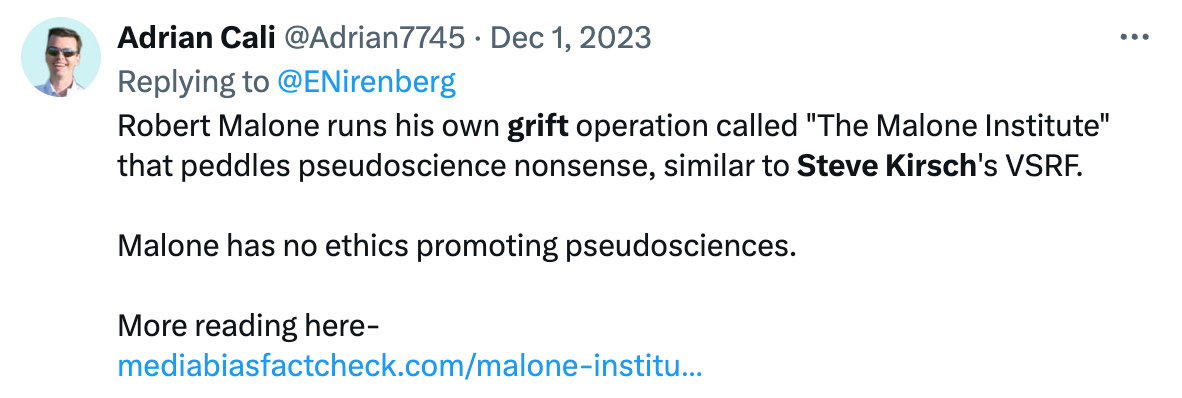The golden age of grift
Grift: it's a moniker whose time has come, especially if you're out of favor with the mainstream and its mouthpieces.
On October 12, 2015, The New York Times ran a glowing article about “visionary tech entrepreneurs” with “brilliant minds.” The paper gushed: “It’s hard to overestimate the potential benefit of what Elizabeth Holmes has developed with her tech company Theranos.”
Four days later, The Wall Street Journal showed it was actually not that hard to overestimate. A nearly 3,000 word front-page story on October 16, 2015 detailed Holmes’ many dubious practices. That story would eventually lead to her disastrous fall from grace.
“Investors have poured more than $400 million into Theranos, valuing it at $9 billion,” wrote the Journal’s John Carreyrou. “But Theranos has struggled behind the scenes to turn the excitement over its technology into reality.”
It would eventually be revealed as the ultimate grift. The technology she touted didn’t work at all. Some of it didn’t even exist. By 2022, Holmes would be convicted of defrauding investors, sentenced to serve more than 11 years in prison, and ordered to pay $452 million to victims of her fraud.
When the going was good, the media couldn’t get enough of this blonde-haired Stanford dropout. She was lauded and celebrated and her face graced the cover of many magazines. For a time, Americans seemed intoxicated by a good grifter.
That is, until Donald Trump became President.
The term ‘grifter’ appears to date back to the early 20th century, when it referred to someone plying their criminal talents in small-scale swindling. But since a real estate mogul descended a Manhattan escalator and said he’d run for President, America’s political left has taken the term hostage and weaponized it against anyone they don’t like.
Donald Trump is, of course, the “Grifter in Chief,” and columnist Paul Krugman once said the entire GOP is “A Party Agrift.” In 2021, Salon moaned: When will America break free from the clutches of political grifters?
More recently, Mediaite denounced three opinionated men on Twitter as “deranged right wing grifters” simply because they don’t very much care for pop princess Taylor Swift.
So when is a grift really a grift?
Search “Elizabeth Holmes” and “grift” on Google and you’ll get about 4,000 results. “Sam Bankman Fried” and “grift” gets you 10,000 hits. These people committed actual fraud. And were convicted of it.
But a Google search for “Donald Trump” and “grift” nets 253,000 results, up to and including the launch of his new line of sneakers.
Maybe painting the world with a grift-shaped brush comes part and parcel with a worldview that capitalism is bad. If profits are pernicious, anyone who makes money from anything, including a legitimate business enterprise, must be “a grifter.” That definition starts to fall apart, though, when you look at the media’s full on adulation of Taylor Swift, who has a net worth of over $1 billion.
If selling sneakers is a grift, why isn’t selling concert tickets a grift?
Looking at it a bit deeper, it seems maybe intention has something to do with it. If you set out to make money and do, it’s a grift. If you set out to do something that supports the mainstream narrative and make money while doing so, you’re apparently deserving of all your success — including healthy financial compensation.
Opinion writer John McWhorter makes this point perfectly in an October 2023 New York Times column. He argues that author, professor, and antiracist activist Ibram X. Kendi should not be called a grifter for profiting from his book or his $30,000 speaking fees. Kendi, author of “How to Be an Antiracist,” is said to be worth over $200 million.
McWhorter says, “Kendi’s proposals seek to face, trace and erase racist injustice in society to an unprecedented degree. What makes it sleazy that he be well paid for the effort? How many of us, if engaged in similar activity and offered fat speaking fees and generous book royalties, would refuse them?”
So… let’s get this straight. Fighting racism = not a grift.
Fighting COVID, on the other hand… now that could be a grift, especially if you’re suspicious of the jabs and supportive of alternative therapies.
It seems you’re only worthy of the “grifter” moniker if you buck the trend or swim against the tide. And if, in doing so, you begin to amass a following, like Robert F. Kennedy, Jr., for example, not only are you a grifter, but also a child killer and a “dangerous conspiracy nut.”
(Maybe we need a new, more potent designation: how about Übergrifter?)
And so here we are — living in an age so utterly divided, and so carefully scripted, that even words have political affiliations. It truly is the golden age of grift.







This is just an expansion of an existing strategy from the playbook.
Let me explain the strategy.
Just use any word that is a loaded term but is not a specifically defined legal term but has a very loaded understanding in common usage. Denier, for example, was perfect. On its own, it cannot be legally viewed as derogatory but it brings along with it the attachment of its use associated with people denying the Holocaust.
"Grift" is not a specific criminal act. You can say someone is grifting and not be held accountable for libel or slander. Someone can do things that can be termed grifting that are perfectly legal. If someone complains, just say that they are just hiding behind the legal definition.
Same with conspiracy theorist and anti-vaxxer.
If someone tries to take action against them, they can recoup legal expenses with a SLAPP suit.
Brain dead name callers!